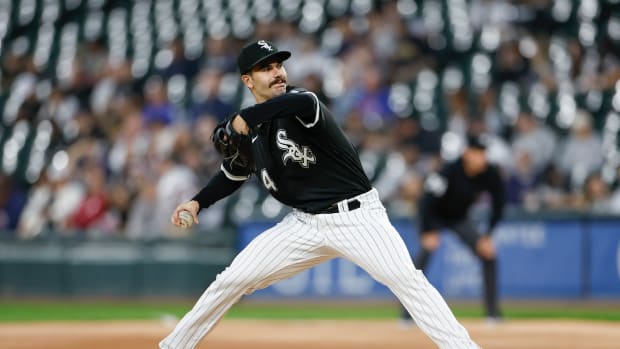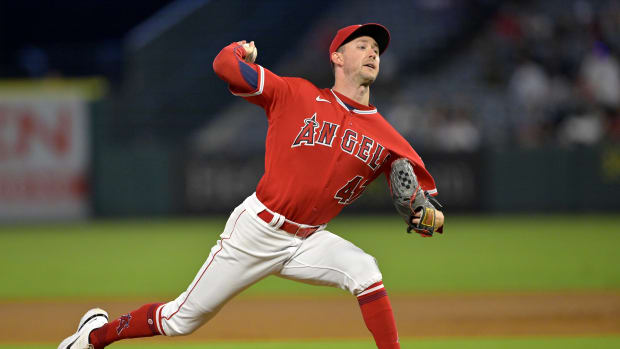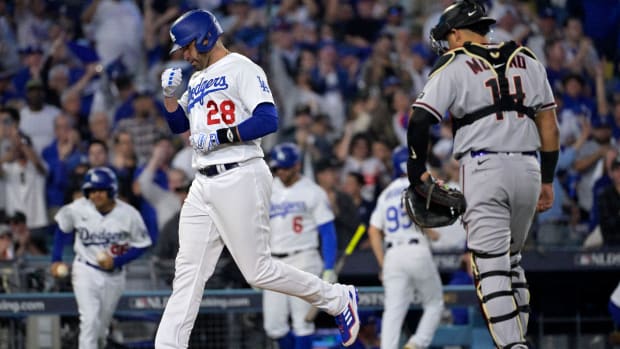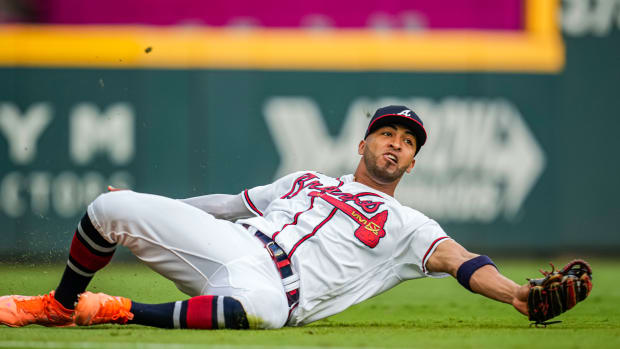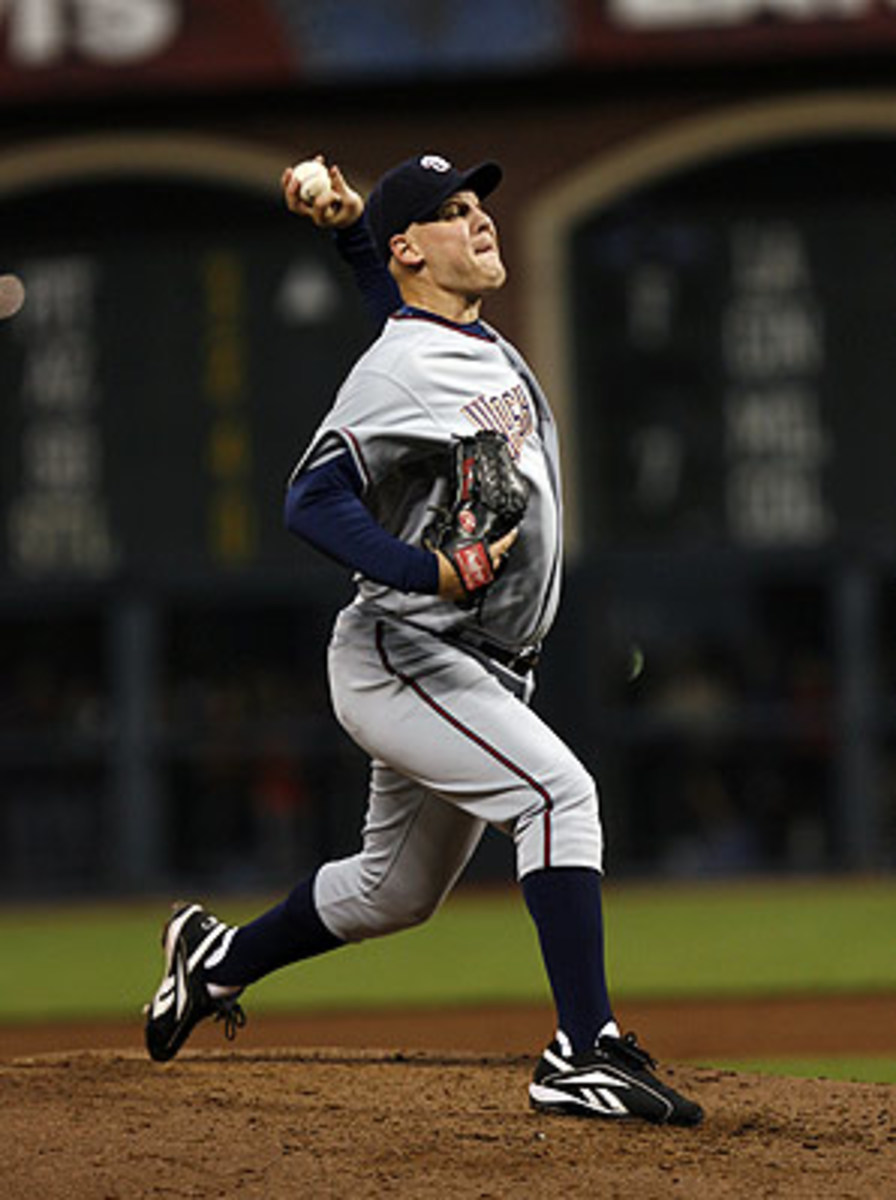
Bacsik fine with role in history
To pass the days in another long season of a career that is growing shorter with each passing day, Mike Bacsik decided he had to do something. His idea: bullpen trivia. And so before the Columbus Clippers four-game road trip last week to Richmond, he went to baseball-reference.com and printed out pages and pages of stats, records and major league award winners to quiz his minor league teammates.
Bacsik, a baseball lifer from Duncanville, Texas, is the son of an ex-major leaguer and at 30, has spent 13 seasons in professional baseball, including 51 games during four-major-league stops, but he found he still had plenty to learn about the game's past. For instance, he learned that there was once a pitcher named Willie Hernandez who won both the Cy Young and MVP awards in the same season (1984), and that Jackie Robinson (1947) and Alvin Dark (1948) were the first two Rookies of the Year at a time when only one player won the award each year.
Then there is baseball's list of milestone home runs and the pitchers who served them up: Babe Ruth's 60th in 1927? Tom Zachary. Bobby Thomson's pennant-winner in 1951? Ralph Branca, of course. Roger Maris' 61st in 1961? Tracy Stallard. Henry Aaron's No. 715 in 1974? Al Downing. Mark McGwire's 62nd in 1998? Steve Trachsel. Barry Bonds' No. 756 on Aug. 7, 2007?
No one had to tell Bacsik the answer to that one. It's him.
If trivia is the fine print of history, Bacsik is right down there with "No purchase necessary'' and "All rights reserved'' in the tiny type of Bonds' career moment. Without him, exactly one year ago today, that memorable and controversial home run for the ages wouldn't have happened . . . at least not then, that inning, that pitch, that night. Had someone else given up that record-breaking home run to Bonds, Bacsik would have been left as ... just who exactly?
"Right now, I'm pretty much a career minor leaguer,'' Bacsik said in a recent phone interview, as the sounds of the Clippers batting practice filled the background. "I've been in the International League for a while now. Even to be on the wrong side of a moment like that, it's definitely a talking point. There are a lot of good players who are forgotten in major league history.''
For what he did last August, Bacsik has ensured that he will never be forgotten, just as Branca, Downing and Trachsel haven't been. Yet he talks about what some might consider a failure, even an embarrassment, as openly and affably now as he did that fateful night in San Francisco. He delights in his contributing role in a moment that was desperate for something or someone light, funny and friendly. A soft-throwing left-hander who had slipped out of the big leagues in 2005 and 2006, Bacsik started for the Washington Nationals at AT&T Park and already had given up a double and a single to Bonds when he faced him again in a 4-4 tie with one out and none on in the bottom of the fifth.
The Giants slugger got up 2-0 in the count, took a fastball for a strike, fouled off Bacsik's next pitch, then watched a breaking ball that missed. Next, Bonds chopped one just foul down the first-base line. Then Bacsik came with an 86-mph fastball that wasn't nearly good enough.
Bond crushed it to right-center, posed with his arms high before leaving the batter's box, then pointed to the heavens as he crossed home plate. The pitcher? He didn't cuss, kick at the dirt, hang his head or stomp around the mound. Instead, Bacsik tipped his cap to Bonds. Later, once both players exited after five innings, he went to the Giants' clubhouse to congratulate the new home run king, getting back a few friendly words and an autographed bat from Bonds. "To be honest,'' Bacsik said this week, ``I was surprised at how nice he was. I'd read the book Game of Shadows.''
After the Nationals came back to win 8-6, the pitcher talked to reporters about his dad's showdown with Aaron -- Mike Bacsik Sr. pitched for Texas and Minnesota from 1975-80 and faced Aaron in a July 1976 game with the Braves and Brewers legend already stalled on No. 755. He also said of the historic moment: "I dreamed about this as a kid. Unfortunately, when I dreamed about it, I was the one hitting the homer.''
One year later, Bacsik said, he still feels as if the moment is surgically attached to his name (Mike Bacsik, the pitcher who gave up...). But 52 weeks is a long time to stretch 15 minutes of fame. While he has seen the play countless times in highlights, he claims never to have watched the game on video. "I gave up five runs in five innings and didn't throw the ball that good,'' he said. "I'd rather watch a game where I can learn something.''
Besides, the way so many fans see it with the exposes and the steroids allegations and the churlishness, Bonds isn't Aaron. Which means Bacsik isn't Downing, or something like that.
"I guess I would say I expected more interest in it,'' Bacsik said. "You would think it would be tremendous. But unfortunately, baseball has kind of decided to move on from Barry Bonds. Right now, I'd say the majority of people are waiting for somebody to break that record, whether it's [Alex Rodriguez] or someone else.''
He admits that, every so often, he checks the interest level in Bonds' record-breaker and thus his role in it from the privacy of his computer keyboard. "I'm on eBay every night -- my wife [Sue] will tell you -- and every four or five nights, I'll check my name,'' Bacsik said. (He has autographed and inscribed baseballs, "I Gave Up No. 756'' for people alleging to be true collectors, only to see them turn up for auction.)
"As time passes, I think this: This record will be respected more, where now it's less,'' Bacsik said. "The way I see it, from about 1988 to 2003 everything that happened, happened in the steroids era. You can't single out one thing and say 'It's bad,' but other things are fine. If you want to say, 'OK, Barry Bonds' record is out,' then you've got to say there's no World Series winners, no Cy Young winners, no MVPs for those years. If you want to erase it, you can erase it. Or you can asterisk if. But you have to asterisk everything.''
At this point, Bacsik is trying to revive a career that feels asterisked. Through Tuesday, he was 7-4 with a 4.43 earned run average in 33 appearances, all in relief, for the fourth-place Clippers. He has spent eight of 13 seasons in the minors since being drafted by the Indians in 1996. "This year? I can't see anything changing,'' Bacsik said. "I feel like the Nationals have moved on from me. They're really struggling and they have a number of young pitchers they want to see. Winning two extra games in September with someone like me doesn't really matter to them. I think we've got kind of a mutual understanding.''
If Bacsik's best baseball is behind him, he's fine with that; a rabid Dallas Mavericks fan, he has interned at TV stations in the offseason, relishes appearances on talk radio and wants to make a career in broadcasting once he's done pitching. Says he'll leave with no regrets, either. Just a smile on his face, sleeping like a baby.
"If I was Mitch Williams or one of those guys who gave up a home run that cost his team a World Series or a playoff, that would be crushing,'' Bacsik said. "I don't think I would want to talk about it. I know I wouldn't return phone calls about it, because it would hurt too much and I would have let down my teammates.
"But this was a regular season game. It didn't hurt us -- we won the game -- and it didn't really have any bad side. You just move on from it. You know you're a pitcher and you're going to give up home runs. I just happened to give up one of the biggest ones in major league history.''
Steve Aschburner covered the Minnesota Timberwolves and the NBA for 13 seasons for the Minneapolis Star Tribune. He has served as president or vice president of the Professional Basketball Writers Association since 2005. His new book, The Good, the Bad & the Ugly: Minnesota Twins, can be ordered here.































